
Transitions Online_Around the Bloc-Serbia Unveils Controversial Monument to Yugoslav Officer
Ignoring Zagreb’s scorn, Serbian ministers and others honor a man whose legacy is interpreted in radically different ways in each country.
More...We kindly inform you that, as long as the subject affiliation of our 300.000+ articles is in progress, you might get unsufficient or no results on your third level or second level search. In this case, please broaden your search criteria.

Ignoring Zagreb’s scorn, Serbian ministers and others honor a man whose legacy is interpreted in radically different ways in each country.
More...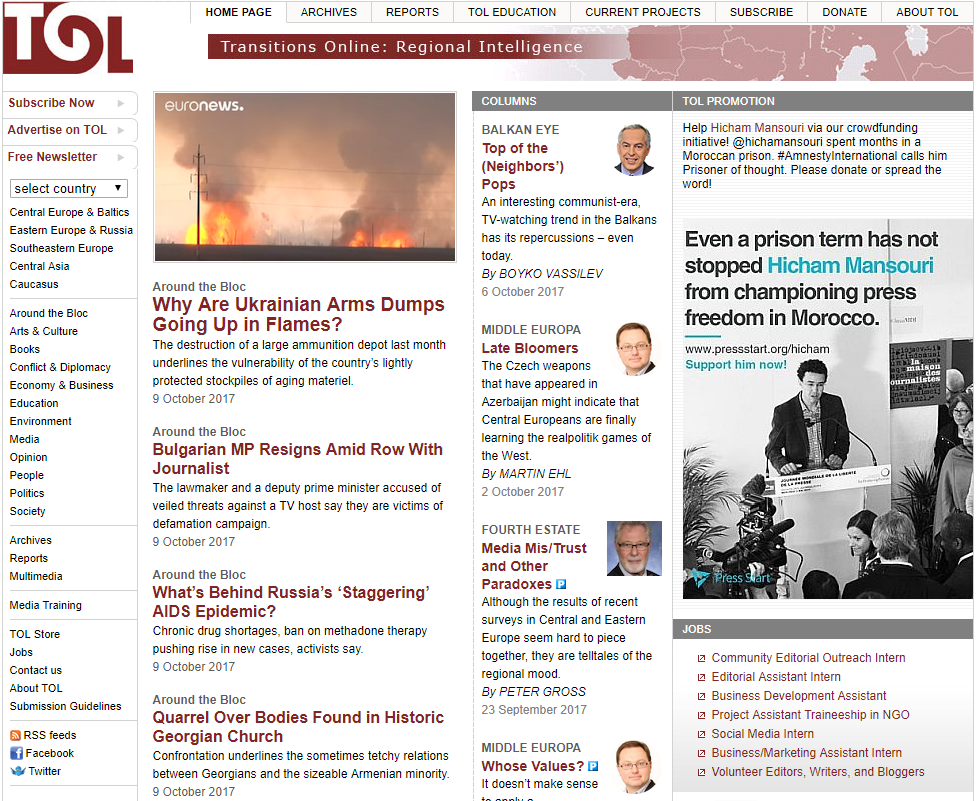
Incidents of alleged electronic espionage provide more clues to Kremlin’s ability to employ hybrid warfare techniques against NATO countries.
More...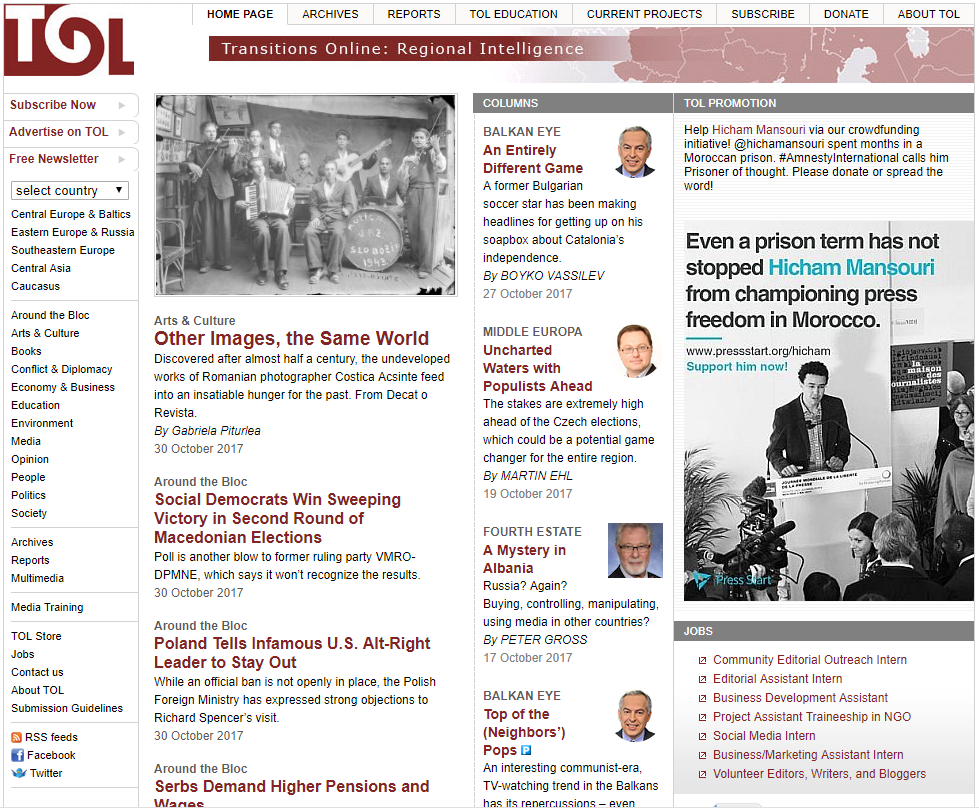
The explosion that seriously injured a nationalist Ukrainian lawmaker last night in Kyiv has claimed another life.
More...
Alliance tries to allay concerns of unpreparedness in the face of Russia’s aggressive European policy.
More...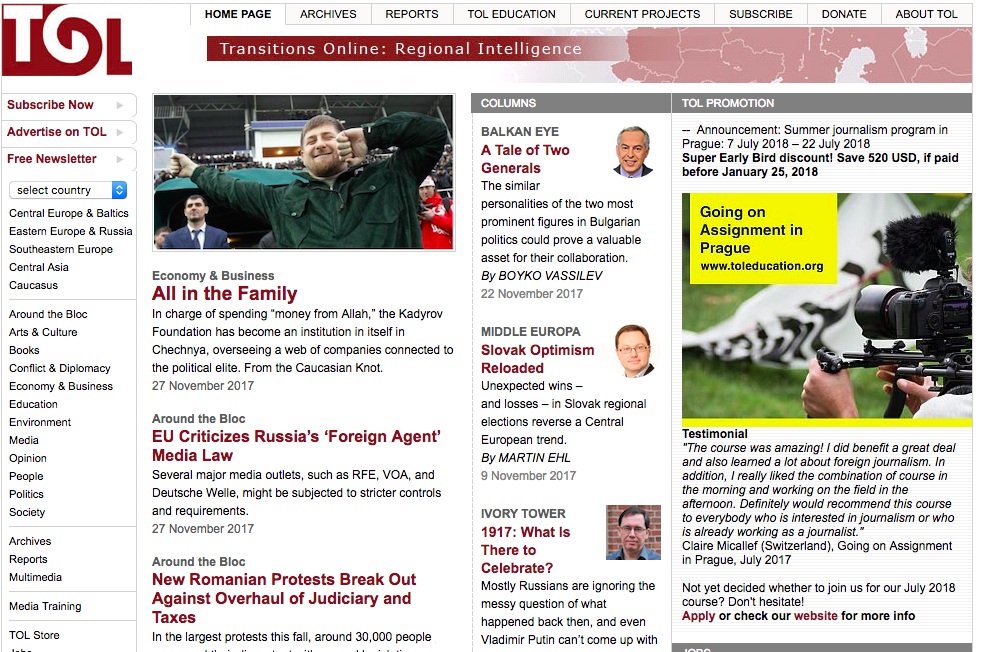
The operation was led by a Ukrainian journalist and involved an embassy adviser, according to the Belarusian KGB.
More...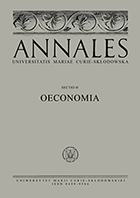
The contradictions and conflicts were, are and will be widespread. There are in all human communities, even in the world of politics, economy and finance. A potential source of conflicts are contradictions. When a conflict of interest is disclosed, a conflict situation arises. In addition to the conflict that brings positive effects there are also destructive conflicts that contribute to the disorganization states, regional communities, institutions and firms. The contradictions of financial interests and destructive conflicts in the sphere of finance are at the heart of research undertaken in this article. The key research problem is therefore the answer to the question of how to minimize the negative consequences of destructive conflicts in the sphere of finance. The main objective is to develop a theoretical and methodological framework for the theory of conflicts in the financial sphere, and to formulate an original concept of good integrated governance, based mainly on assumptions of ordoliberalism.
More...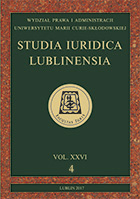
The sphere of national security is the area where various authorities operate. The widest range of competences is granted to the executive, but the legislator (and also the judiciary) is not deprived of influence within this field. The Sejm has special powers within the legislative power. As far as its constitutional competence referring to the national security is concerned, the Sejm essentially takes action not when dealing with the normal functioning of the state, but in the case of specified threats. Even ending a state of war is a consequence of prior specified threats. The constitutional competence of the Sejm in this field basically covers states of emergency and state of war, the latter not being included in this category by the legislator. The Sejm holds here legal tools that allow it to finally decide on the validity of these situations (except for the state of natural disaster, where the Sejm agrees on its extension).
More...
One of the agreements belonging to the United Nations Treaty on human rights is the Convention on the Rights of the Child, adopted on November 20, 1989. It is a fundamental document of the international protection of the rights of the child. On this basis, an organ was created to ensure the observance of the right in the Convention – the Committee on the Rights of the Child. In the later years three Optional Protocols were adopted. The first two concern substantive law – the Optional Protocol to the Convention on the Rights of the Child on the Involvement of Children in Armed Conflict and the Optional Protocol to the Convention on the Rights of the Child on the sale of child prostitution and child pornography of 25 May 2010. The Third Optional Protocol to the Convention on the Rights of the Child on a communications procedure of 19 December 2011 introduces the reform of the Committee on the Rights of the Child through the procedure of individual and interstate notifications. This article focuses on the analysis of the changes and attempts to assess their practical application
More...
While the move signals a step forward for the two countries, some worry that war graves will become magnets for Greek irredentists.
More...
Spats in Chisinau over the country’s East-West orientation continue as well between embittered president and government.
More...
In my paper, I describe the discussion on the ethnogenesis of the Slavs in the Polish historiography. The interest to the origins of the own community is strongly connected with the historical way of thinking and was not alien to the founders of the Antic civilisation: the Greeks and the Romans. This way of thinking was taken over by the «Barbarians», who tried to prove their participation in the world of Antic civilization and inherited by the medieval and modern intellectuals. The development of the critical historiography chronologically overlapped with the birth of modern nationalisms. It determined the ethnogenetical discussions, which had the old task to glorify the own nation and to give the arguments in the conflicts on disputed territories. The Polish discussion on the Slavic ethnogenesis with participation of historians, archaeologists, philologists, anthropologists and ethnologists stood in shadow of the conflict with the Germans on the «historical rights» to the (West-Polish / East German) territories of Great Poland, Pomerania, Silesia, Mecklenburg, Lusatia. The Indigenous conception of the ethnogenesis of the Slavs dominated in the discussions, according to which it were the Polish lands which were the cradle of Slavs and a basis for the Slavic expansion to the greater part of Europe. This conception with some changes and nuances still prevails mainly in the discourse of the humanists from Poznań and Wrocław. The Allochtonic conception was developed in research centre of Cracow and is now popular also among the Slavists from Warsaw and Lublin. According to them, the Slavs originated in the Dnieper basin and Polesie and expanded to Central Europe only in the 6th century. The present-day discussion is dominated by the disputes between the supporters of both groups, which are often full of personal emotions, which make the consensus almost impossible.
More...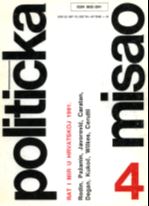
In trying to suggest the real character of the war in Croatia the author points to the differences of existing peace initiatives and movements with regard to the conflict in question. From the perspective of political strategies the author analyzes three approaches to the resolution of the conflict in former Yugoslavia: (1) Pax americana, defined by the confrontation o f the traditional superpower, USA, and the new, strong Europe headed by Germany. (2) Pax serbiana, as a renewal of the ≫Yugoslav≪ type of state with the purpose of maintaining control over its most developed areas. (3) Pax croatica, which is being implemented through the creation o f the Croatian state in terms of a civil society ruled by law and a gradual integration of Croatia into Europe.
More...

Review of: Richard A. Gabriel "Nema više heroja - Ludilo i psihijatrija u ratu"; Alfa, Zagreb, 1991. by: Vlatko Cvrtila
More...
The Catalonian crisis has hardened Madrid’s resistance to recognition of the former Serbian province.
More...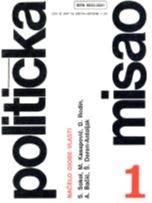
Kada je Vaclav Havel u listopadu 1989. primio Nagradu za mir Njemačkog knjižarskog udruženja, samo nekoliko tjedana prije nego što je srušena vlast u Češkoslovačkoj, nije mogao osobno održati govor u povodu primitka nagrade, jer mu je bila uskraćena češkoslovačka izlazna viza. U govoru, naslovljenom »Riječ je o riječi« (Havel, 1990), koji je u Havelovo ime pročitao jedan glumac, njegov prijatelj, bilo je riječi o alergiji koju čak i danas kod mnogih stanovnika Istočne Evrope izaziva sam spomen riječi »mir«. Zahvaljujući njezinoj neprestanoj upotrebi i sramnom načinu na koji je trebala opravdavati nimalo obrambenu vanjsku politiku i represivnu unutarnju politiku, riječ je izgubila mnogo od svoje vrijednosti, pa gotovo više i nije moguće privući ozbiljniju teorijsku i političku pozornost u vezi s »ugrožavanjem mira«. To nije izmijenila ni činjenica da je uništenje čovječanstva nuklearnim ratom posljednjih desetljeća nesumnjivo bila teško shvatljiva, pa ipak stvarna mogućnost koja se ocrtavala na horizontu. Premda je neupitno da su događaji iz 1989. umanjili vjerojatnost atomskog rata u Evropi između supernaoružanih vojnih blokova, ne možemo u povodu toga navijestiti praskozorje ere vječnog mira i držati da je pogibelj od nenamjernog samouništenja nešto što proizlazi isključivo iz ekoloških konzekvencija našeg gospodarskog života.
More...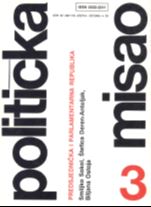


Review of: Mato Artuković „Ideologija srpsko-hrvatskih sporova“ (Srbobran 1884—1902); Zagreb, »Naprijed«, 1991. by: Anđelko Milardović-Ivanković
More...
Senior Russian lawmaker confirms deployment of ballistic missiles in Kaliningrad.
More...